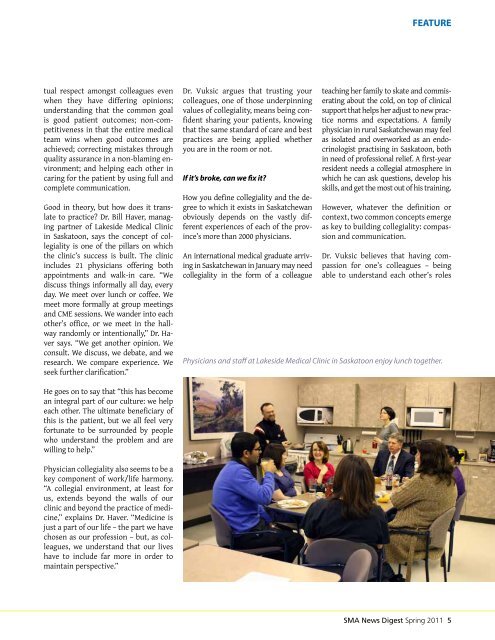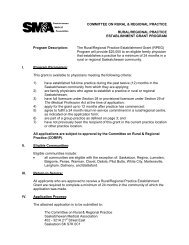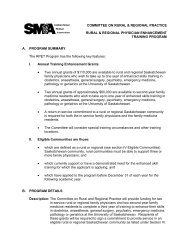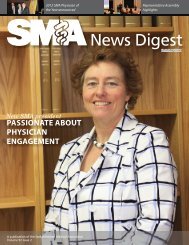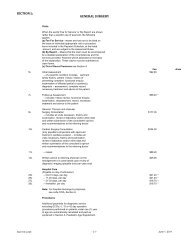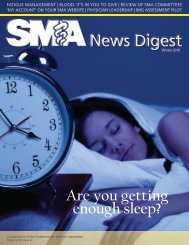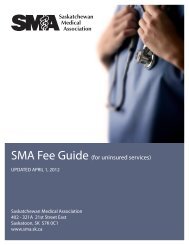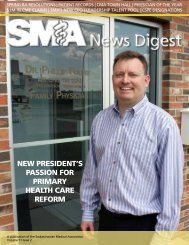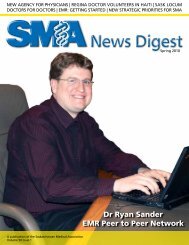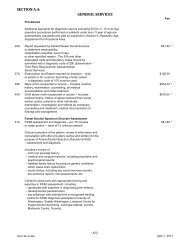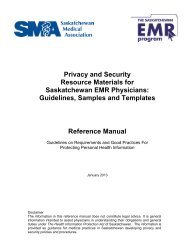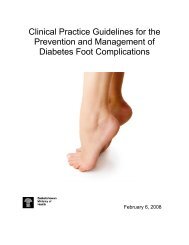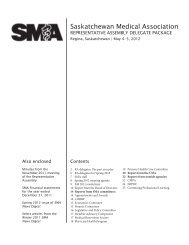Examining collegiality in Saskatchewan - Saskatchewan Medical ...
Examining collegiality in Saskatchewan - Saskatchewan Medical ...
Examining collegiality in Saskatchewan - Saskatchewan Medical ...
Create successful ePaper yourself
Turn your PDF publications into a flip-book with our unique Google optimized e-Paper software.
tual respect amongst colleagues even<br />
when they have differ<strong>in</strong>g op<strong>in</strong>ions;<br />
understand<strong>in</strong>g that the common goal<br />
is good patient outcomes; non-competitiveness<br />
<strong>in</strong> that the entire medical<br />
team w<strong>in</strong>s when good outcomes are<br />
achieved; correct<strong>in</strong>g mistakes through<br />
quality assurance <strong>in</strong> a non-blam<strong>in</strong>g environment;<br />
and help<strong>in</strong>g each other <strong>in</strong><br />
car<strong>in</strong>g for the patient by us<strong>in</strong>g full and<br />
complete communication.<br />
Good <strong>in</strong> theory, but how does it translate<br />
to practice? Dr. Bill Haver, manag<strong>in</strong>g<br />
partner of Lakeside <strong>Medical</strong> Cl<strong>in</strong>ic<br />
<strong>in</strong> Saskatoon, says the concept of <strong>collegiality</strong><br />
is one of the pillars on which<br />
the cl<strong>in</strong>ic’s success is built. The cl<strong>in</strong>ic<br />
<strong>in</strong>cludes 21 physicians offer<strong>in</strong>g both<br />
appo<strong>in</strong>tments and walk-<strong>in</strong> care. “We<br />
discuss th<strong>in</strong>gs <strong>in</strong>formally all day, every<br />
day. We meet over lunch or coffee. We<br />
meet more formally at group meet<strong>in</strong>gs<br />
and CME sessions. We wander <strong>in</strong>to each<br />
other’s office, or we meet <strong>in</strong> the hallway<br />
randomly or <strong>in</strong>tentionally,” Dr. Haver<br />
says. “We get another op<strong>in</strong>ion. We<br />
consult. We discuss, we debate, and we<br />
research. We compare experience. We<br />
seek further clarification.”<br />
He goes on to say that “this has become<br />
an <strong>in</strong>tegral part of our culture: we help<br />
each other. The ultimate beneficiary of<br />
this is the patient, but we all feel very<br />
fortunate to be surrounded by people<br />
who understand the problem and are<br />
will<strong>in</strong>g to help.”<br />
Physician <strong>collegiality</strong> also seems to be a<br />
key component of work/life harmony.<br />
“A collegial environment, at least for<br />
us, extends beyond the walls of our<br />
cl<strong>in</strong>ic and beyond the practice of medic<strong>in</strong>e,”<br />
expla<strong>in</strong>s Dr. Haver. “Medic<strong>in</strong>e is<br />
just a part of our life – the part we have<br />
chosen as our profession – but, as colleagues,<br />
we understand that our lives<br />
have to <strong>in</strong>clude far more <strong>in</strong> order to<br />
ma<strong>in</strong>ta<strong>in</strong> perspective.”<br />
Dr. Vuksic argues that trust<strong>in</strong>g your<br />
colleagues, one of those underp<strong>in</strong>n<strong>in</strong>g<br />
values of <strong>collegiality</strong>, means be<strong>in</strong>g confident<br />
shar<strong>in</strong>g your patients, know<strong>in</strong>g<br />
that the same standard of care and best<br />
practices are be<strong>in</strong>g applied whether<br />
you are <strong>in</strong> the room or not.<br />
If it’s broke, can we fix it?<br />
How you def<strong>in</strong>e <strong>collegiality</strong> and the degree<br />
to which it exists <strong>in</strong> <strong>Saskatchewan</strong><br />
obviously depends on the vastly different<br />
experiences of each of the prov<strong>in</strong>ce’s<br />
more than 2000 physicians.<br />
An <strong>in</strong>ternational medical graduate arriv<strong>in</strong>g<br />
<strong>in</strong> <strong>Saskatchewan</strong> <strong>in</strong> January may need<br />
<strong>collegiality</strong> <strong>in</strong> the form of a colleague<br />
FEATURE<br />
teach<strong>in</strong>g her family to skate and commiserat<strong>in</strong>g<br />
about the cold, on top of cl<strong>in</strong>ical<br />
support that helps her adjust to new practice<br />
norms and expectations. A family<br />
physician <strong>in</strong> rural <strong>Saskatchewan</strong> may feel<br />
as isolated and overworked as an endocr<strong>in</strong>ologist<br />
practis<strong>in</strong>g <strong>in</strong> Saskatoon, both<br />
<strong>in</strong> need of professional relief. A first-year<br />
resident needs a collegial atmosphere <strong>in</strong><br />
which he can ask questions, develop his<br />
skills, and get the most out of his tra<strong>in</strong><strong>in</strong>g.<br />
However, whatever the def<strong>in</strong>ition or<br />
context, two common concepts emerge<br />
as key to build<strong>in</strong>g <strong>collegiality</strong>: compassion<br />
and communication.<br />
Dr. Vuksic believes that hav<strong>in</strong>g compassion<br />
for one’s colleagues – be<strong>in</strong>g<br />
able to understand each other’s roles<br />
Physicians and staff at Lakeside <strong>Medical</strong> Cl<strong>in</strong>ic <strong>in</strong> Saskatoon enjoy lunch together.<br />
SMA News Digest Spr<strong>in</strong>g 2011 5


